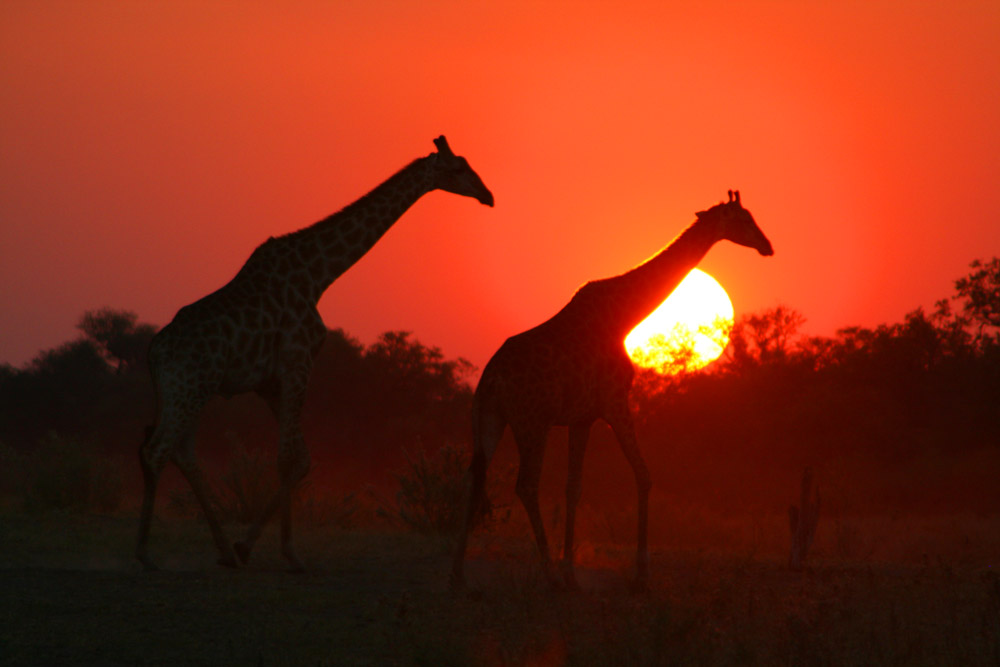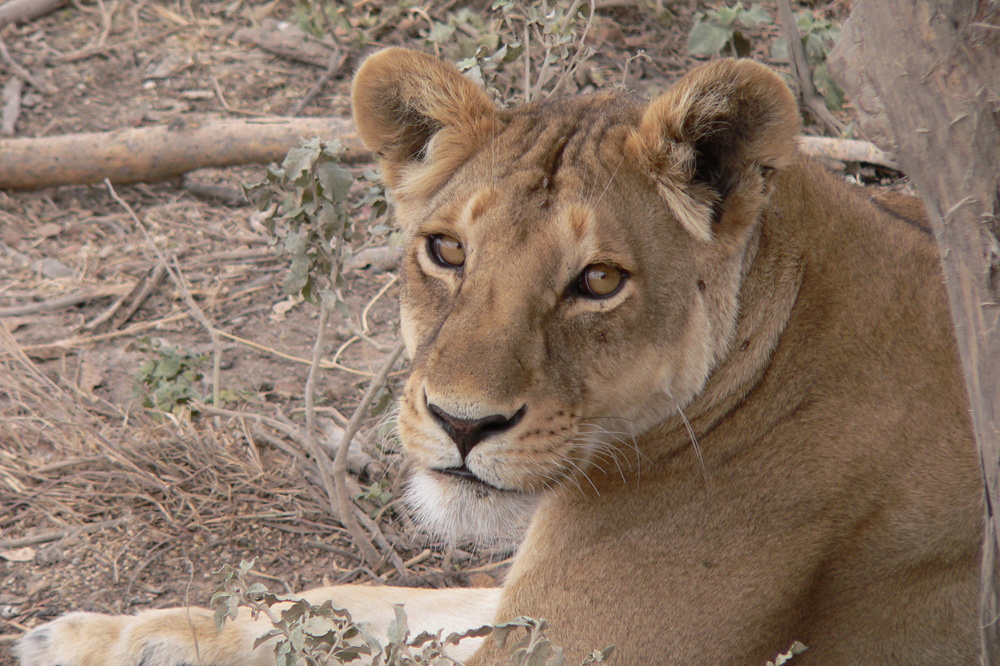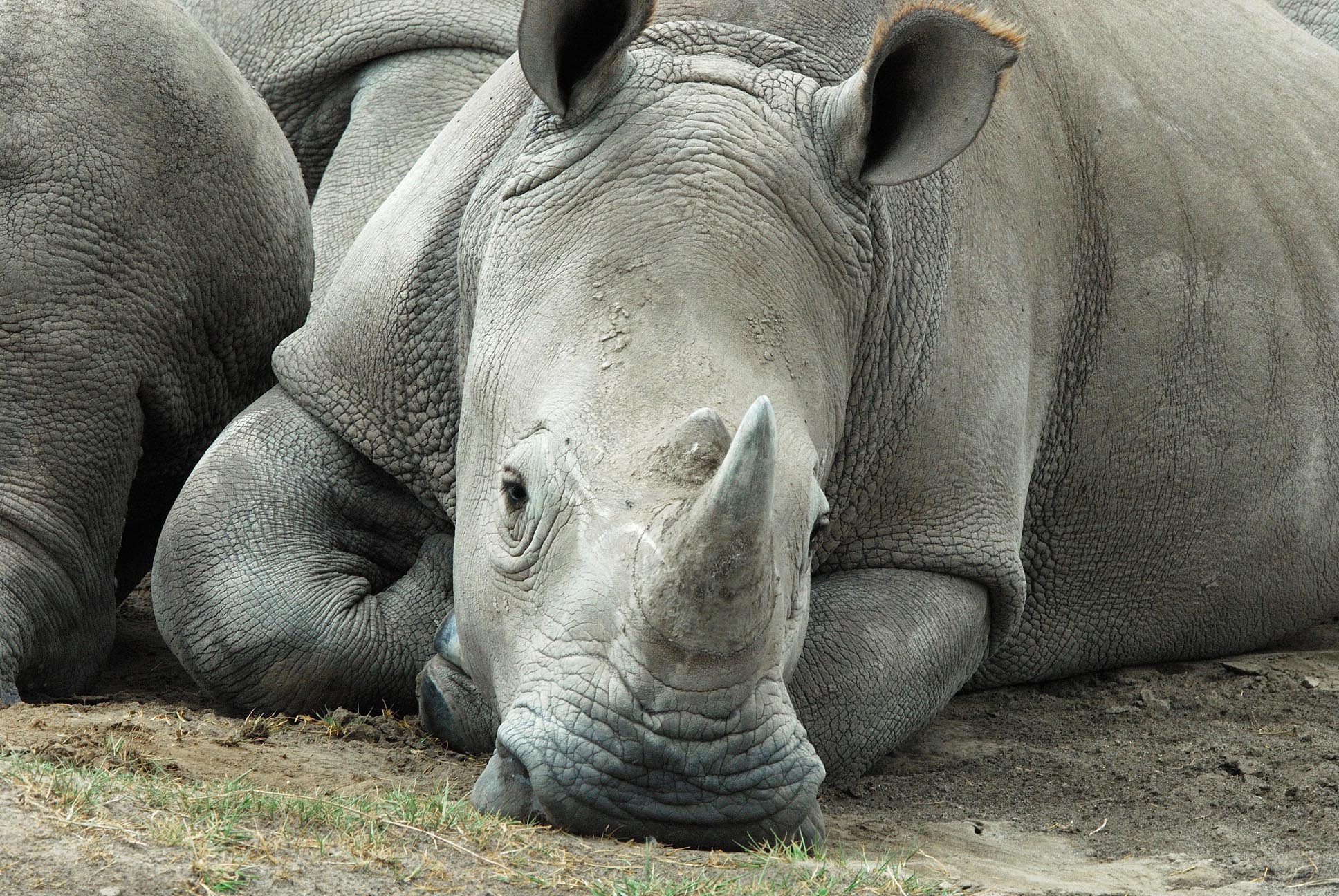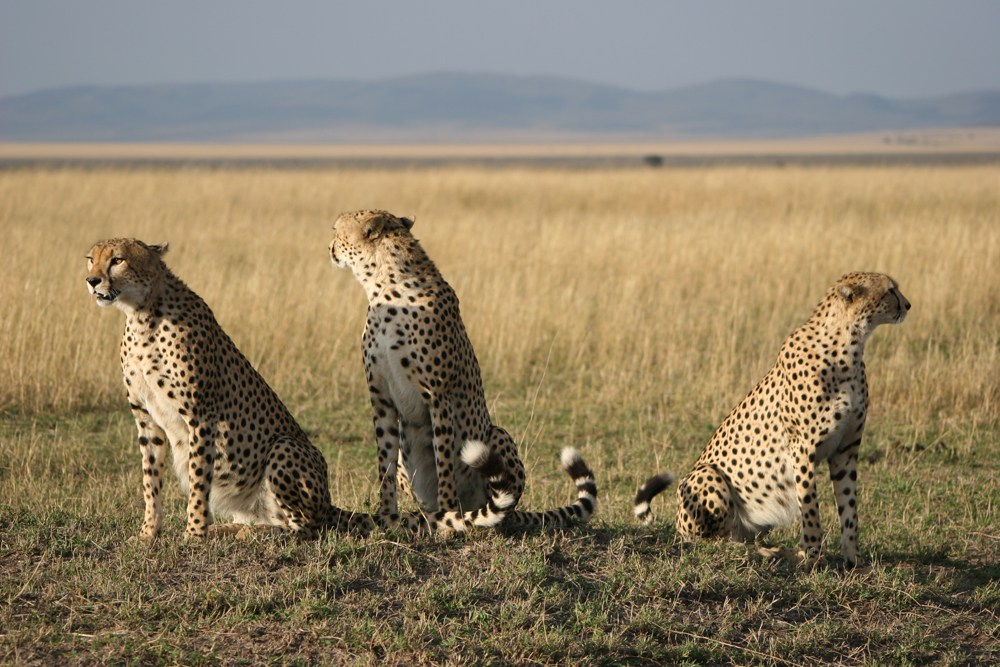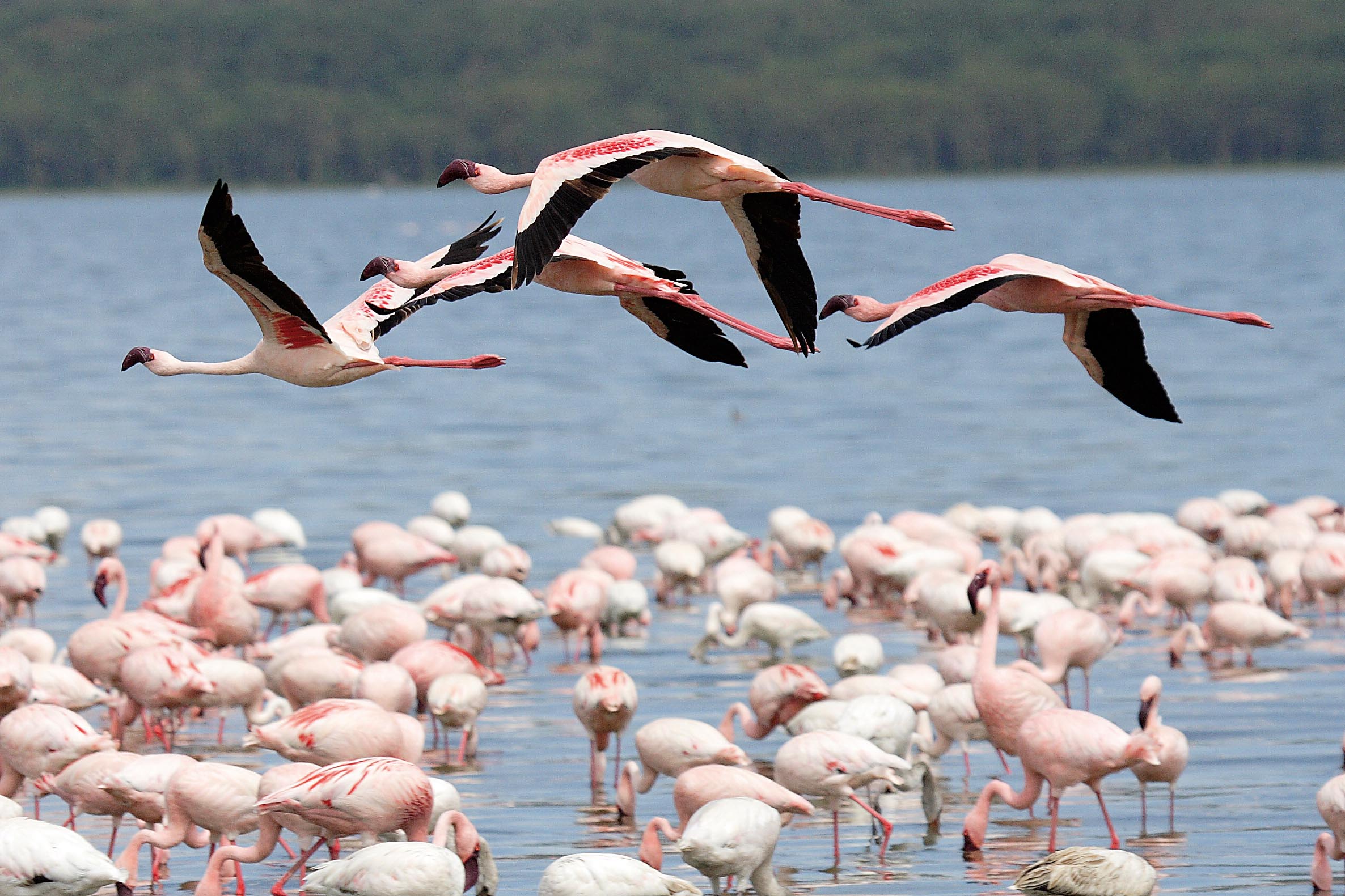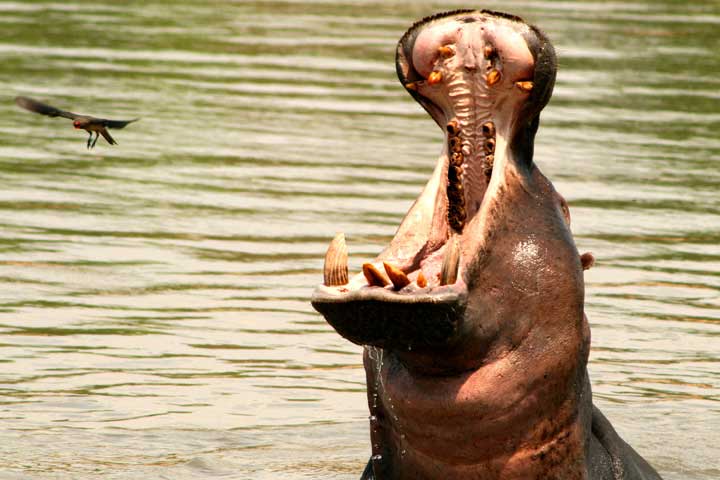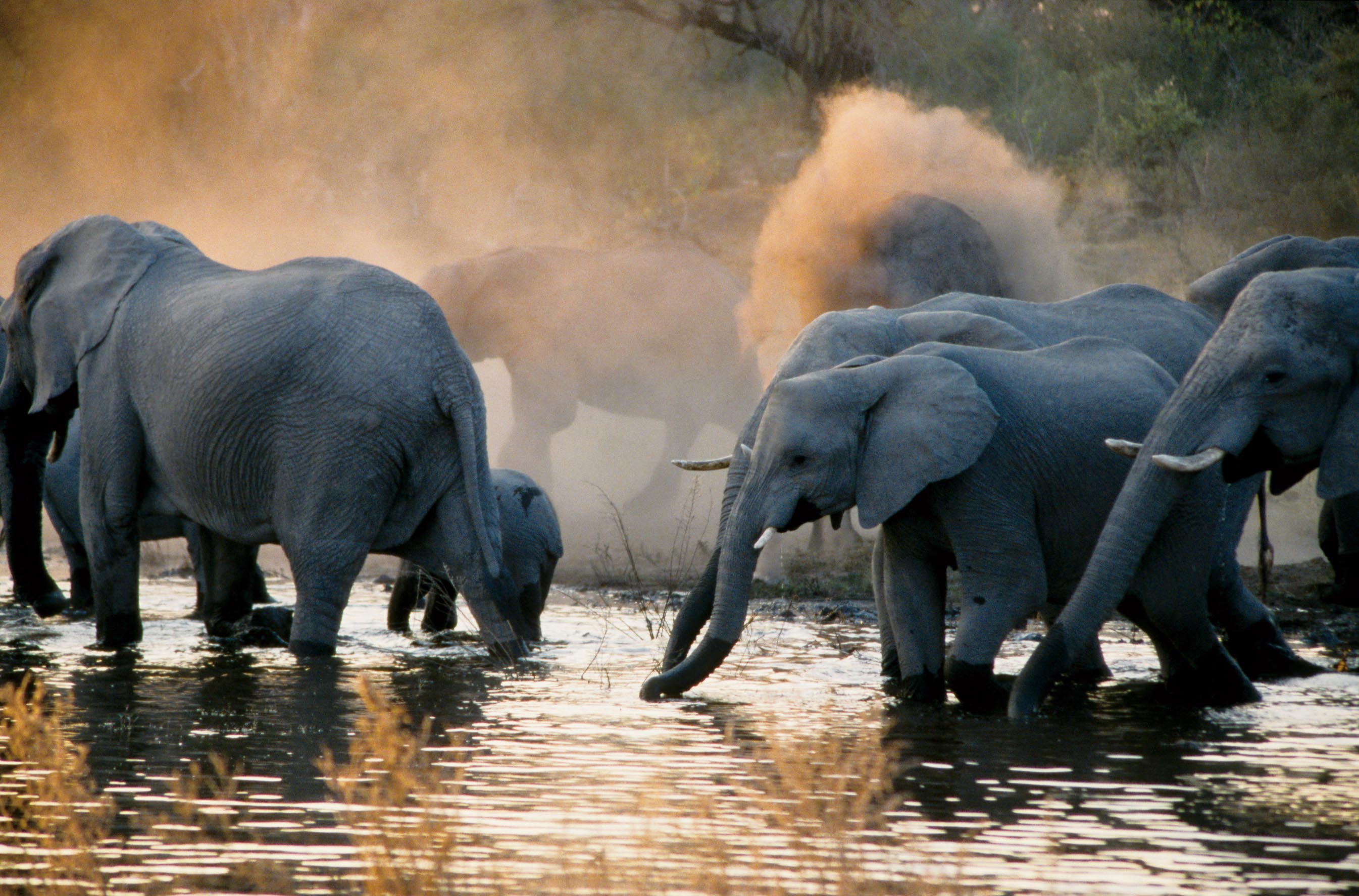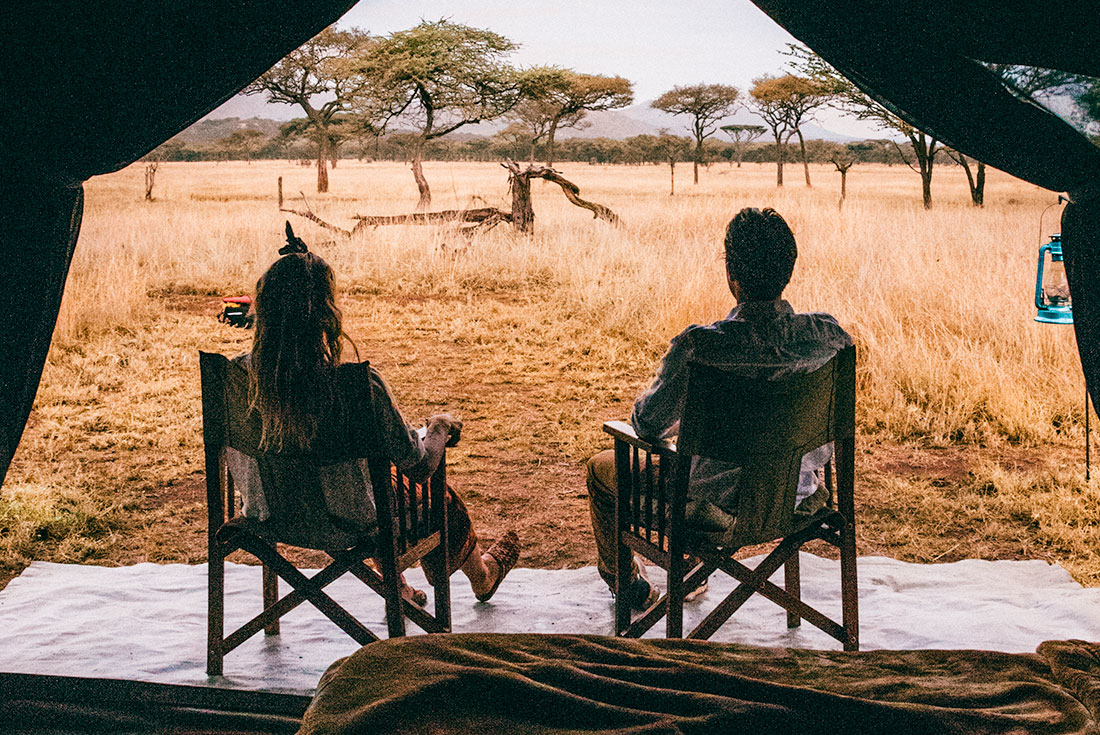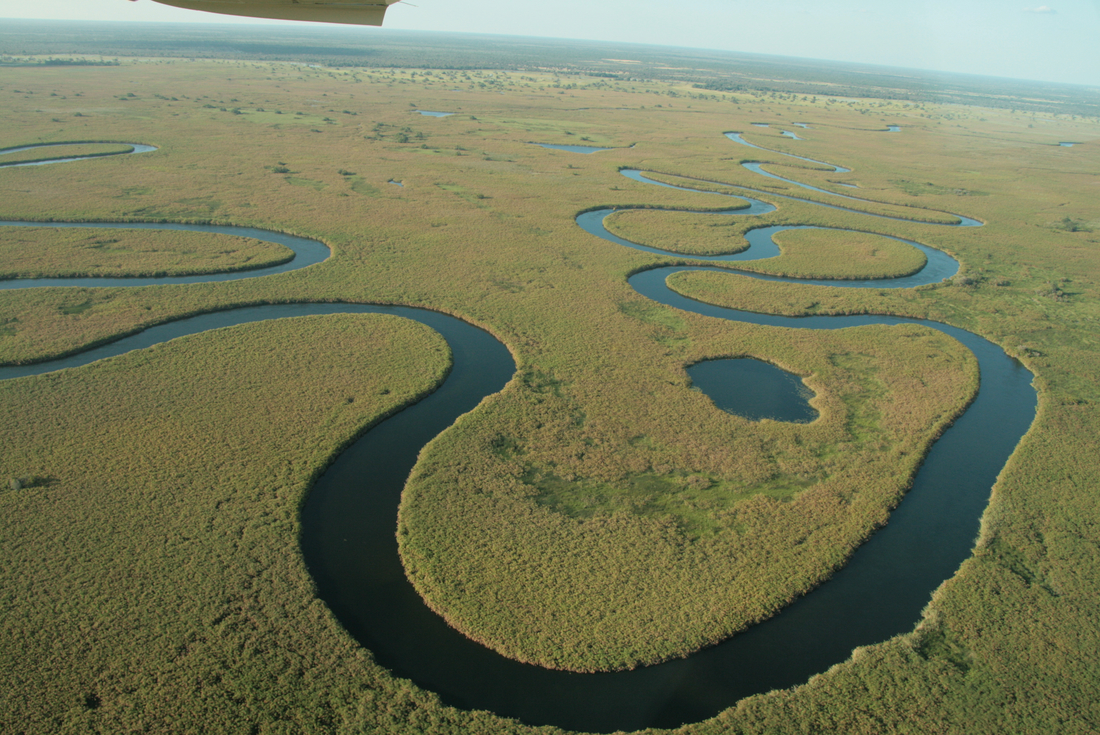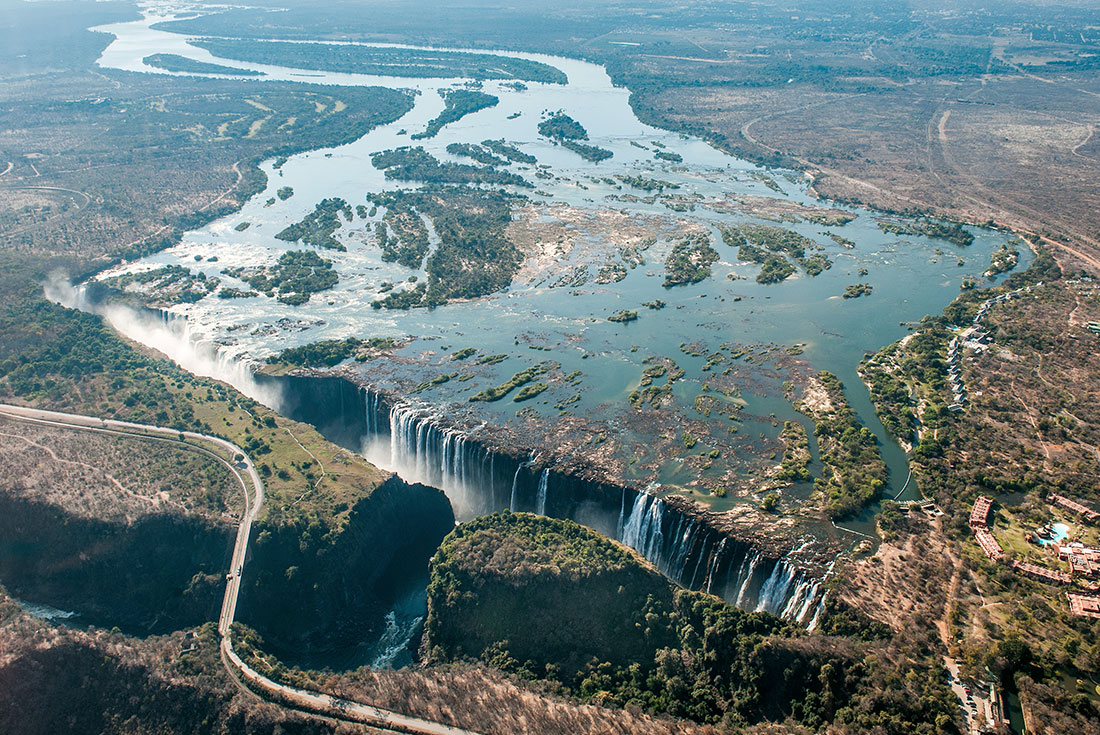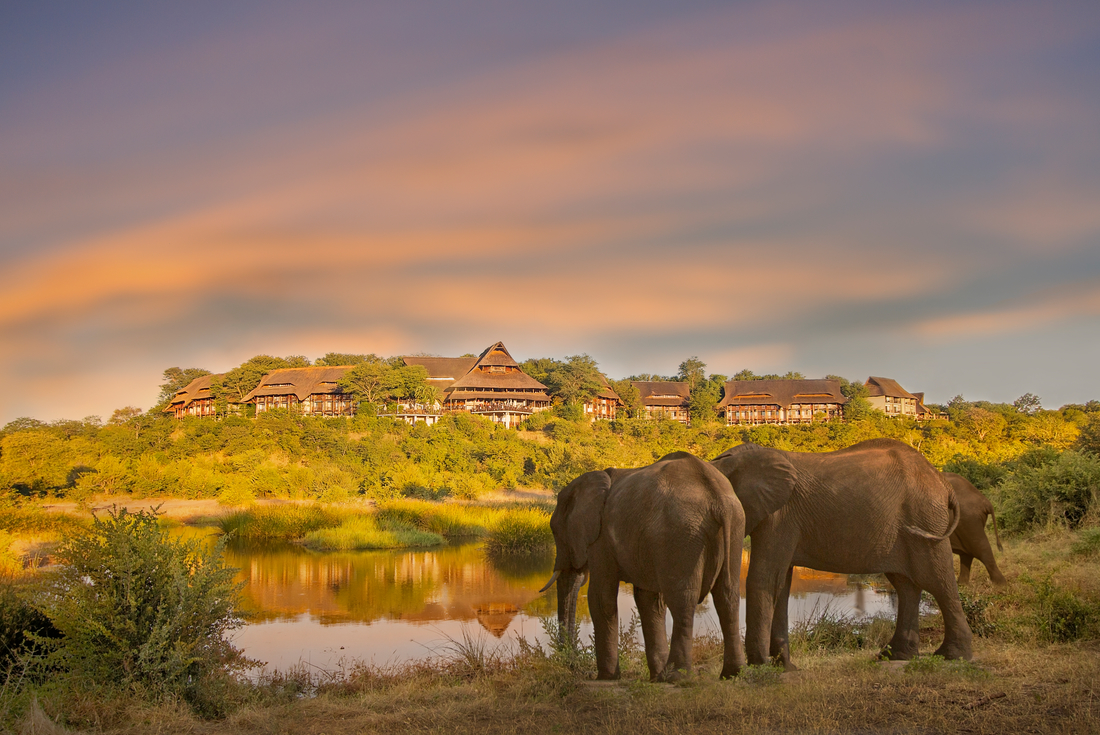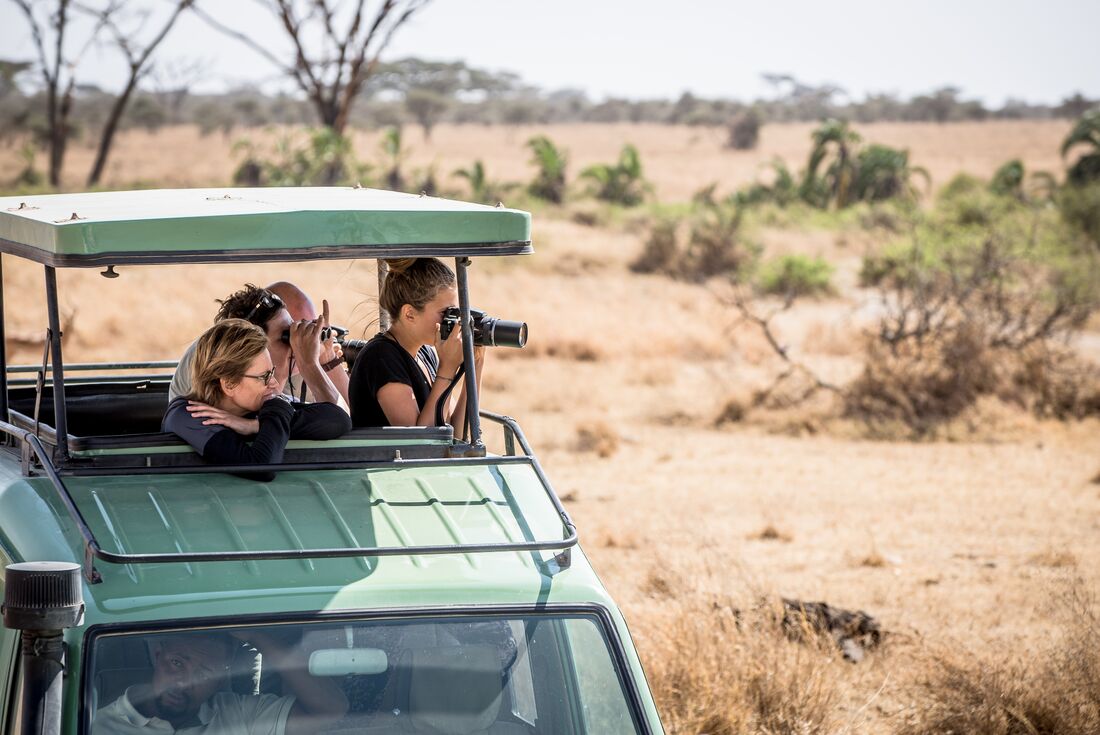- Explore some of Africa's premier regions for viewing wildlife – the Serengeti, Masai Mara, Etosha and Chobe – and venture through the spectacular World Heritage-listed Ngorongoro Crater by 4WD.
- Visit the Maasai, known for their vibrant red dress and elaborate jewellery, and enjoy a fascinating talk, full of insights into this remarkable and ancient culture.
- Riding a traditional mokoro along the Okavango Delta, taking in the thundering Victoria Falls and watching the sunset from your houseboat are some of the many ways you'll Africa’s beautiful waterscapes.
- As eerie as they are fascinating, the sand dunes of the Sossusvlei can be seen in all their blazing beauty from the top of Dune 45.
- Step inside Faldela's Purple House in the Bo-Kaap region of Cape Town for an authentic home-cooked dinner. Taste some of the traditional dishes such as 'Bredie', 'Chilli Bites' and 'Koesisters'.
23 Aug 2021
Classic Africa Safari
PFASC
Validity: 01 Jan 2020 to 31 Dec 2021
From the vast grasslands of East Africa and the wildlife of Botswana to the desert landscapes and diverse cultures of Namibia and South Africa, this continent truly has it all. Spend 39 unforgettable days travelling from Nairobi to Cape Town, embarking on multiple 4WD safari game drives in the Masai Mara, Serengeti and Ngorongoro Crater, all filled with panoramic vistas and wondrous wildlife. Relax on the pristine shores of Zanzibar and soak up the natural wonders at Makgadikgadi Pans and Victoria Falls. Continue by overland vehicle to Okavango Delta and Chobe River, and in Namibia, see how vast herds of herbivores make Etosha National Park one of the continent’s premier game-viewing destinations. Wind up discovering Damara culture, scaling dunes and canyons before tasting the wines of South Africa. With local leaders on call each step of the way and a keen group of adventurers joining you, see the sweeping savannas and search for the Big Five on an epic safari through Africa's best.
Peregrine
Overland,Wildlife
Custom-built overland vehicle,4WD safari vehicle,Houseboat,Mokoro,Boat,Plane,Private vehicle
3
This trip includes a canoe paddle in Orange River. A level of fitness is also required to get in and out of the safari vehicles and mokoro (traditional dugout canoe). Further please note that the roads, particularly in Kenya, are in quite poor condition and you may experience a fair amount of bouncing around on some long travel days.
Hotel Panafric
Cnr Kenyatta Ave/Valley Road
Nairobi
KENYA
Phone: +254 202720822
Sarova Panafric is imposingly set in a quiet residential suburb, overlooking Kenyatta Avenue, thus commanding a panoramic view of Nairobi 's skyline. Panafric is set in spacious natural gardens less than a kilometre from the city centre.
An airport arrival transfer is included. This transfer is only valid if arriving on day 1 or if you have booked pre-trip accommodation through Peregrine. Please provide your flight details at the time of booking, or at a minimum 15 days prior to travel (note - we may not be able confirm request made within 15 days of travel). Once you have provided your details a transfer representative will be booked to meet you at the airport and transfer you to your hotel. Your driver will be waiting for you in the arrivals hall holding a Peregrine sign with your name. The driver will wait for an hour after your scheduled arrival time. If you fail to see our representative walk to the Grand Voyage Travel Agency Desk which is located at the left side of the arrival terminal and request your transfer. Grand Voyage Travel Agency: Tel: +254 722-717336 / +254 722-260627 Or +254 733 523 813 If you are making your own way to the hotel, there is a taxi stand outside the airport building. A taxi should cost approximately US$60, and must be paid in Kenyan Shillings. The Panafric is located roughly 20kms from Nairobi International Airport. Transfers should take around 30 minutes - but as Nairobi traffic can be heavy, it may take much longer.
The Commodore Hotel
Portswood Square Portswood Rd
V&A Waterfront
Cape Town
8002
SOUTH AFRICA
Phone: +27 214151000
Overlooking Cape Town's vibrant V&A Waterfront, where Table Mountain and the sea meet, the Commodore is ideally located. It is close to countless restaurants and shops and offers views of the harbour, Robben Island and Table Mountain. The hotel facilities include an outdoor pool with poolside bar, beauty spa and free Wifi in public areas. Guest rooms are fully air conditioned and include a TV with satellite channels, in room safe, ensuites and free WiFi. The hotel is 21kms from Cape Town International Airport.
A private departure transfer is available for pre-booking through Peregrine. Please speak to your booking agent for more information. If you have pre-booked a departure transfer, please ensure you have provided Peregrine with your departure flight details at least 15 days before the departure of your Peregrine trip.
1. A complimentary airport arrival transfer is included; valid if you are arriving on Day 1 or if you have booked pre-tour accommodation through us. You must provide your flight details to your booking agent at least 14 days prior to travel. 2. A single supplement is available if you’d prefer not to share a room on this trip. The single supplement excludes Days 22 and 23 (houseboat) and Day 24 (Ghanzi lodge) where you will be in shared accommodation, and is subject to availability. Please speak to your booking agent for further information. 3. This trip travels on purpose-built overland vehicles. This means there are restrictions on the size and weight of your luggage. Please refer to the Packing section of the Essential Trip Information for details. 4. This trip includes domestic and international flights as indicated on the trip map. The luggage allowance is 20kg for check in luggage and 7kg for carry on. All your luggage must be soft-sided – no hard-sided check in or carry on luggage. 5. Cabins on the Okavango Houseboat are smaller than a standard room. We recommend packing a small bag with only what you’ll need for two nights on the houseboat. The rest of your luggage will remain with the truck. Bathroom facilities on the houseboat are shared. 6. The lodges used in Ghanzi support the local San D’Kar community, and are owned and run by the San people. This is a unique, cultural Kalahari experience and the standard of accommodation may be below what you would expect on a Peregrine trip – but the experience is well worth it. 7. You will be unescorted for the Zanzibar section of this trip, but our local representatives will be on hand to look after you.
All group trips are accompanied by one of our group leaders. The aim of the group leader is to take the hassle out of your travels and to help you have the best trip possible. We endeavour to provide the services of an experienced leader however, due to the seasonality of travel, rare situations may arise where your leader is new to a particular region or training other group leaders. Your leader will provide information on the places you are travelling through, offer suggestions for things to do and see, recommend great local eating venues and introduce you to our local friends. While not being guides in the traditional sense you can expect them to have a broad general knowledge of the places visited on the trip, including historical, cultural, religious and social aspects. We aim to support local guides who have specialised knowledge of the regions we visit. If you were interested in delving deeper into the local culture at a specific site or location then your leader can recommend a local guide service in most of the main destinations of your trip.
Many national governments provide a regularly updated advice service on safety issues involved with international travel. We recommend that you check your government's advice for their latest travel information before departure and ensure that your travel insurance covers you for all areas your itinerary covers. Please refer to our website's travel alerts page for links to major travel advisories and updates on safety issues affecting our trip. PERSONAL BELONGINGS: We strongly recommend the use of a neck wallet or money belt while travelling, for the safe-keeping of your passport, air tickets, cash and other valuable items. Leave your valuable jewellery at home - you won't need it while travelling. Many of our hotels have safety deposit boxes, which is the most secure way of storing your valuables. A lock is recommended for securing your luggage. FREE TIME: Your leader will accompany you on all included activities, however during your trip you'll have some free time to pursue your own interests, relax and take it easy or explore at your leisure. Please use your own good judgement when selecting an activity in your free time. Please also note that your group leader has the authority to amend or cancel any part of the trip itinerary if it's deemed necessary due to safety concerns.
FIRE PRECAUTIONS Please be aware that local laws governing tourism facilities in this region differ from those in your home country and not all the accommodation which we use has a fire exit, fire extinguishers or smoke alarms. BALCONIES Some hotel balconies don't meet western standards in terms of the width of the balcony fence being narrower than 10cm. TRAFFIC AND DRIVING ON THE OTHER SIDE OF THE ROAD Depending on where you come from please note that drivers in this part of the world may drive on the opposite side of the road from what you are used to. Look both ways before crossing any road. Traffic can be a little more chaotic than you might be used to at home. Be aware! SEAT BELTS Please be aware that local laws governing transportation safety may differ from those in your home country and not all the transport which we use is able to provide seat belts. PICK POCKETING & PERSONAL SAFETY While travelling there is always the risk of pick-pocketing and petty theft, particularly in the more touristy cities. We recommend that you exercise caution when walking at night and encourage you to walk in groups and only on main, well-lit thoroughfares. Be particularly vigilant on public transport. Simple measures like carrying your day pack on your front, not hanging your bag over the back of your chair or on the floor and wearing a money belt will reduce any chance that your valuables should go missing. WATER SAFETY Please take care when taking part in any activities in the ocean, river or open water, where waves and currents can be unpredictable. It's expected that anyone taking part in water activities is able to swim and have experience in open water. All swimmers should seek local advice before entering the water. TRAVEL ADVICE & TRAVEL INSURANCE We recommend that you check your government's advice in relation to the areas you will be visiting for their latest travel information before departure and ensure that your travel insurance covers you for all areas your itinerary covers.
HOMOSEXUALITY IN TANZANIA Homosexuality is illegal in Tanzania (including Zanzibar) and is not tolerated in Tanzania’s conservative society. Public displays of homosexuality like holding hands or kissing in public places could lead to arrest and up to 30 years’ imprisonment. In June 2017, the Tanzanian Government announced a 'crackdown' on LGBQTI rights advocates operating in Tanzania, threatening arrest. We recommend that you refer to your government's official travel advisories for the most up to date advice before you travel.
BILHARZIA Bilharzia is a parasitical disease which is usually spread by swimming in contaminated water. It can be assumed that the infection is present, to a greater or lesser extent, in almost all water sources, but most especially in shallow reedy waters in the vicinity of villages. Although the adult parasites do not themselves cause a great deal of harm, after about 4-6 weeks they start to lay eggs, which triggers an intense but usually ineffective immune response, the symptoms of which can include fever, cough, abdominal pain, and an itchy skin complaint known as safari itch. After a while the symptoms settle down and the patient is left with a sense of feeling tired all the time.
PASSPORT You will need a valid passport to travel internationally. As a general rule, most countries require that your passport has a minimum of 6 months validity remaining. Your passport details are required to complete your booking. Please ensure the name on your passport matches the name on your booking and airline tickets exactly and contact us immediately if there are any errors. We recommend taking copies of the main passport pages and other important documents with you as well as leave copies at home with family or friends. VISAS Visas are the responsibility of the individual traveller. Entry requirements can change at any time. It is important that you check your government's foreign travel advisories along with the consular website of the country or countries you are travelling to for the most up to date information specific to your nationality and circumstances. Please be aware that not all visa information found online from other sources may be valid while COVID-19 restrictions are in place. Visas can take several weeks to process, so make sure you research the requirements as soon as you have booked your trip to allow for obtaining any necessary documents as well as the application and processing time. Your booking consultant can advise on a visa processing service or you can apply yourself directly through a consulate. COVID-19 Entry and Exit Requirements Below you will find general visa advice about the destinations on your trip. Due to constantly evolving COVID-19 requirements and restrictions, please refer to your government's foreign travel advice for the most up to date information.You may also refer to our travel alert page for more info https://www.intrepidtravel.com/en/travel-alerts Make sure you are familiar with the current border measures and entry requirements as these are quite complex and changing frequently without notice. Please also ensure you have a travel insurance policy that covers your travels as well as medical or COVID-19 related expenses within the country. RETURN TRAVEL Please ensure you stay up to date with any current testing or quarantine requirements for returning to your home country or transiting through other destinations after the completion of your tour. We are able to help facilitate taking a COVID-19 test while on trip. Please ensure you have funds available to cover the cost of this test which will be payable directly to the testing site. Your Intrepid Tour Leader will provide more details at the group meeting as well as assist with booking appointments for all travellers who need to be tested. Starting from 1st January 2021, visas will no longer be issued on arrival in Kenya. If you require a visa, it is mandatory that you hold a Kenyan electronic visa (e-visa) prior to leaving your home country or boarding an aircraft. Single-entry visas (business or tourism) are USD50, EUR40, or GBP30 and a transit visa (valid for three days) is USD20. The single entry visa allows for multiple entries in to Kenya for a period of 90 days provided you have not left East Africa. The four-step e-Visa procedure is completed through the immigration website: www.evisa.go.ke and requires visitors to submit an application form and passport-sized photo. e-Visas can take around seven working days to process. Visitors will then be required to present their printed e-Visa upon entry to Kenya. **IMPORTANT** If you are travelling on one of our itineraries that re-enters Kenya, you will need to take multiple copies of your e-Visa - one to present at each border crossing. TANZANIA: It is possible to obtain a tourist visa for a single entry at any one of the following main entry points to Tanzania, subject to the fulfilment of all immigration and health requirements for approximately USD$50 in cash (post 2006 USD): -Dar es Salaam International Airport -Zanzibar International Airport -Kilimanjaro International Airport (KIA) -Namanga Entry Point (Tanzania-Kenya border point) -Kasumulu Border crossing -Isebania Border crossing Alternatively you will need to purchase your visa in advance at any Diplomatic or Consulate Mission of the United Republic of Tanzania abroad. The cost is approximately USD100 depending on nationality and should take one business day. At the present time you do not require a multi entry visa to Kenya, Tanzania and Uganda due to an agreement between the three countries (i.e. if you exit Kenya to Tanzania you can re-enter Kenya on the same visa). However if your trip visits Tanzania twice after a visit to a country other than those listed above, you may need to purchase two visas. Visa processes at both Kilimanjaro International Airport and land border crossings can take some time so we recommend all travellers obtain a visa in advance. If obtaining a visa on arrival at Kilimanjaro International Airport you will be required to: o Queue for a Government Control Number o Queue to pay for this at the bank o Queue for Immigration to check and issue the visa For the purpose of the visa application you can use the following address: Kibo Palace Hotel PO Box 2523 Old Moshi Road Arusha - Tanzania Phone: +255 272544472 SOUTH AFRICA: Many countries do not need visas to visit South Africa as a tourist for up to three months. Please check with the relevant consulates as to whether a visa is required Entry Requirements – Passports: Please note that non-machine readable passports are no longer accepted by South African immigration. All visitors to South Africa must have a machine readable travel document (e-passport). Failure to present an e-passport will result in denied entry. Passengers with a valid visa issued in a non-machine readable passport will be handled on a case by case basis, but a fine will still be applicable. Entry Requirements - Yellow Fever Certificate: A valid Yellow Fever Vaccination Certificate is required for all passengers over one year of age who arrive or are transiting through South Africa, from a country or region listed by the World Health Organization as infected by yellow fever. Travellers unable to present a valid yellow fever vaccination certificate issued at least 10 days before arrival in South Africa will be refused entry. There is no option for travellers without a vaccination certificate to be vaccinated on arrival. Please note this also includes transiting through an infected country or region. NEW ZEALAND PASSPORT HOLDERS: Effective 15th August 2019, New Zealand visitors no longer require a visa for South Africa. ZIMBABWE: Zimbabwe visas are required by most nationalities, including from the EU, US and Australia. For most nationalities, Zimbabwe visas are available at the point of entry. If you plan to purchase your visa on arrival you will need approximately USD30/45 in cash. All nationalities should check with their nearest Zimbabwe Embassy for up to date information. For passengers from countries that require visas prior to arrival there is an E-Visa where information can be found at https://www.ivisa.com/zimbabwe-visa KAZA Visa: The Kaza visa is valid for travel between Zambia and Zimbabwe. It is available at land borders at Livingstone (Zimbabwe border) and Kazungula (Botswana border). The cost of the visa is USD$50 and is valid for 30 days as long as you stay within Zimbabwe and Zambia. BOTSWANA: Please check with your relevant consulates as to whether a visa is required. For passengers requiring a visa to Botswana, application forms can be downloaded from http://www.gov.bw/en/ as well as instructions for applying. Entry Requirements - Yellow Fever Certificate: A valid Yellow Fever Vaccination Certificate is required for all passengers over one year of age who arrive or are transiting through Botswana, from a country or region listed by the World Health Organization as infected by yellow fever. Travellers unable to present a valid yellow fever vaccination certificate issued at least 10 days before arrival will be refused entry. There is no option for travellers without a vaccination certificate to be vaccinated on arrival. Please note this also includes transiting through an infected country or region. Children travelling to Botswana: Please note that if you’re travelling to Botswana with a person under the age of 18 then you need to provide a certified copy of the child’s full unabridged birth certificate in order to enter the country (the one listing the child’s details and both parents’ details. - the short birth certificate which only lists the child’s details won’t be accepted). Additionally, if the child is travelling with only one parent, with neither biological parent, or is unaccompanied, then they must provide an affidavit of consent of the parent(s) that are not travelling, to prove that the trip is made with both parents' consent. Please contact your nearest Botswanan Embassy if you have further questions regarding this. NAMIBIA: Many nationalities are not required to obtain a tourist visa in Namibia if traveling for a maximum period of 90 days. For other nationalities, please contact the local consulate or embassy for visa requirements. Please check with the relevant visa office before departure to make sure there has been no change. BORDER CROSSINGS There will be 4 land border crossings on this trip: Day 8: Kenya to Tanzania at the Isebania border crossing Day 18: Zimbabwe to Botswana at the Kazungula border post Day 25: Botswana to Namibia at the Mamuno/Buitepos border post Day 37: Namibia to South Africa at the Noordoewer border post
Explore some of Africa's premier regions for viewing wildlife – the Serengeti, Masai Mara, Etosha and Chobe – and venture through the spectacular World Heritage-listed Ngorongoro Crater by 4WD.
Visit the Maasai, known for their vibrant red dress and elaborate jewellery, and enjoy a fascinating talk, full of insights into this remarkable and ancient culture.
Riding a traditional mokoro along the Okavango Delta, taking in the thundering Victoria Falls and watching the sunset from your houseboat are some of the many ways you'll Africa’s beautiful waterscapes.
As eerie as they are fascinating, the sand dunes of the Sossusvlei can be seen in all their blazing beauty from the top of Dune 45.
Step inside Faldela's Purple House in the Bo-Kaap region of Cape Town for an authentic home-cooked dinner. Taste some of the traditional dishes such as 'Bredie', 'Chilli Bites' and 'Koesisters'.
Purpose-built overland vehicles are used for the Southern Africa portion of this trip, while 4WD safari vehicles are used in East Africa. While these vehicles are not air-conditioned, all windows open to allow fresh air flow. Be prepared for some dust, heat and wind. This itinerary features some long travel days, which can be exacerbated by bumpy African roads. It is recommended that you pay close attention to the given approximations of driving hours. Overlanding is the perfect journey for those travellers with an open mind and the spirit for adventure. However it may be quite different to any style of travel you have experienced before. For more information, head to www.peregrineadventures.com/africa-overland As the early bird catches the worm, the early camper sights the animals. There will be many early starts either to make use of the better safari time or to beat the morning traffic on long travel days. You don't need to be a professional athlete to go on an overland safari, but you will need a good level of physical resilience and movement, especially for entering and exiting the vehicles. There's also a half-day canoe activity along the Orange River on this trip. Namibia summer (November–March) can be very hot and humid with maximum temperatures around 30-35°C and peaks of over 40°C in the desert. Botswana temperatures rise in the hot dry period of September and October before the rains hit and temperatures can get as high as 34-38°C. Please carefully consider the time of the year you wish to travel and your suitability to that season.
GENERAL HEALTH All travellers need to be in good physical health in order to participate fully on this trip. When selecting your trip please make sure you have read through the itinerary carefully and assess your ability to manage and enjoy our style of travel. Please note that if in the opinion of our group leader or local guide any traveller is unable to complete the itinerary without undue risk to themselves and/or the rest of the group, we reserve the right to exclude them from all or part of a trip without refund. You should consult your doctor for up-to-date medical travel information or for any necessary vaccinations before departure. We recommend that you carry a first aid kit as well as any personal medical requirements as they may not easily be obtained while travelling. COVID-19 The safety and wellbeing of our travellers, leaders, crew, staff, and suppliers continues to remain our highest priority as we travel. You can read more about how we will keep you safe on our trips, including our COVID-19 Health & Safety Guidelines here: https://www.peregrineadventures.com/safe-travels HEALTH SCREENING If you are unwell prior to travelling, please stay at home and contact us to make alternative arrangements. At the group meeting, you will be asked to complete a self-screening health form and report any COVID-19 symptoms as well as any close contact with someone who has suspected or confirmed COVID-19. If you are displaying any symptoms or have any health concerns at this time, we will follow the advice of local health authorities to determine whether medical assistance, isolation or further action is required. We ask all travellers to continue to monitor their health throughout their travels and report any relevant symptoms to their tour leader. TESTING & VACCINATION POLICY From 1st May 2021 we have introduced new safety measures that apply on all of our trips, except for tours in Australia and New Zealand. You will need to show either of the below to your leader at the Group Meeting on Day 1 of your trip: - Proof of COVID-19 vaccination, or - Proof of negative COVID-19 test conducted no more than 72 hours before day 1 of your trip, or - Proof of recovery documentation In addition, if you’re aged 70+ or have an existing health condition that puts you at a higher risk of serious COVID-19 disease, you are also required to provide proof of vaccination before you can join a trip. This policy is in addition to any specific testing or vaccination requirements for entry to a destination or required by your airline. For more information, including a detailed FAQ about this policy, please visit: https://www.peregrineadventures.com/covid19 YELLOW FEVER: A valid international certificate of vaccination against Yellow Fever is required in many countries if you are arriving from a country with risk of yellow fever (eg. Kenya). You may need to present this on arrival at the airport or border crossing. Some countries will refuse entry if you are unable to present your certificate. It's also quite common for your home country to request a Yellow Fever certificate on your arrival back home. It is your responsibility to check with your doctor well in advance of leaving home about the Yellow Fever requirements for the countries you'll be visiting. TYPHOID: It is recommended that if you are travelling to Harare you make sure that your Typhoid vaccinations are up to date. There has been an outbreak of typhoid in parts of Harare, with over 1500 cases reported since October 2011. For more information speak to your doctor and see the World Health Organization (WHO) website. TSETSE FLY: It is best to avoid dark coloured clothes such as blue and black while on safari. These colours can attract the biting tsetse fly. DRINKING WATER As a rule we recommend you don't drink tap water, even in hotels, as it may contain much higher levels of different minerals than the water you are used to at home. For local people this is not a problem as their bodies are used to this and can cope, but for visitors drinking the tap water can result in illness. Generally this isn't serious, an upset stomach being the only symptom, but it's enough to spoil a day or two of your holiday. Many hotels and lodges provide safe drinking water, while bottled water is another alternative. Water consumption should be about two litres a day. Rehydration salts, motion sickness tablets, and diarrhoea blockers are available from many pharmacies.
Your group leader will endeavour to cater for specific dietary requirements where possible, and vegetarianism and gluten intolerance will be catered for in most instances. Please notify your group leader of any dietary requirements in your group meeting at the start of the trip. For those suffering from particular food allergies, your group leader will endeavour to disclose to their fullest knowledge the main ingredients in dishes being consumed. It is, however, your personal responsibility to ensure that you do not ingest any foods to which you are allergic. Alcoholic or non-alcoholic beverages are not part of included meals. LODGE-PACKED MEALS: There are a number of days on this itinerary where your breakfast or lunch will be a ‘packed picnic meal’ provided by our lodge. Packed meals usually consist of a sandwich, a piece of fruit, a juice, and a snack such as potato chips/crisps, nuts, muffin, or a muesli bar. On some days your crew will shop and prepare lunches themselves using the truck picnic gear and utensils. This usually happens when we have early morning game drives and want to get into the park by sunrise, are out in National Parks all day, or in some instances, en-route to our next destination when there is little or no alternatives.
When it comes to money matters on the trip, every traveller is a little different. You know your spending habits better than we do, so please budget a sensible amount for things like meals not included, drinks, shopping, optional activities, tipping and laundry. It’s always better to bring a little more than you think you’ll need. Also make sure you’ve read your trip details thoroughly so you know what’s included in the trip price and what isn’t. This should make budgeting a little easier. You’ll find this info in the Inclusions section of your Essential Trip Information (that’s this document). Please note: all recommendations for additional costs are in USD. You will need to convert these into the relevant local currency. MEALS NOT INCLUDED Breakfast, dinner and most lunches are included while on our overland safaris and/or lodge based trips. For lunches not included, a budget of USD10 to USD15 per meal will be more than sufficient. For dinners not included, your leader will normally recommend options and restaurants where you can safely try the local specialties of the region. Expect meals to cost between USD12 to USD25 for a main. These are indicative prices only. If you are in a tight budget or are happy to try local food, you can eat cheaper than this. If you want to try just the finest food at the finest restaurants, then you can expect meals to cost as much as in western countries. TIPPING Gratuities for all services are included in the cost of your trip. Although not compulsory, if you feel you have received outstanding services throughout your trip, you may also consider tipping your leader and crew (if applicable) as these are not included. The amount is entirely a personal preference; however as a guideline USD2 to USD4 per staff member, per day can be used. Of course you are free to tip more or less as you see fit, depending on your perception of service quality and the length of your trip. Remember, a tip is not compulsory and should only be given when you receive excellent service. EMERGENCY FUNDS We try to plan for every eventuality, but there are still some things beyond our control. Please make sure you bring an extra USD500 for emergencies (e.g. natural disasters or civil unrest). Sometimes these things necessitate last minute changes to our itineraries, and we can’t guarantee there won’t be some extra costs involved. CREDIT CARDS, ATMS AND MONEY EXCHANGE: Credit cards are generally accepted in tourist shops and some restaurants across Africa. Visa and Mastercard are generally preferred over American Express, Diners, etc. Smaller venues take cash only. Foreign currency is easily changed at exchange bureaus and they generally offer the best rates. With ATMs being increasingly available in the many major towns and cities, credit or debit cards are a convenient way to access money. Be aware that your withdrawing limit may vary from country to country (regardless of your withdrawing limit in your home country) and it can be as low as the equivalent to USD100 per day. Throughout Africa, cards with the Visa logo are most readily recognised, although MasterCard is also accepted in most places. A charge is made for each international transaction - please check with your bank how much this fee will be. Check with your bank before leaving home that your card can be used as a debit card in Africa. You may also want to notify your bank that you are visiting Africa as it's not unknown for banks to freeze cards which show sudden transactions in other countries. If you're on a multi-country tour, your tour leader will be able to give you an approximate idea of how much money you may need for your stay in each country. PLEASE NOTE: Many businesses and banks in Africa, especially East Africa, do not accept US dollar notes older than 2006. If you are bringing USD, we strongly recommend large bills in good condition, 2006 series onwards only. Any old or damaged notes may not be accepted. ACCESSING CASH IN ZIMBABWE: Zimbabwe has now reverted to their own currency, Zimbabwe dollars. However accessing this currency can be difficult and exchanging money at banks encounters long queues. Optional activities can still and must be paid in USD, while visas on arrival can also be paid in USD. On ground costs such as lunches and market purchases must be paid in Zimbabwe dollars or by using a credit card. You should plan your travel expenses in advance and bring sufficient USD into the country to support your stay. Your leader or local representative will be on hand to advise on this matter should you need it.
We recommend you pack as lightly as possible and make sure that you are able to carry and lift your own luggage, and walk with it for short distances. Most travellers carry their luggage in a backpack, although an overnight bag with a shoulder strap would suffice if you travel lightly. Smaller bags or backpacks with wheels are convenient although we recommend your bag has carry straps. You'll also need a day pack/bag to carry water and a camera etc for day trips. Below are some ideas and helpful tips on what you specifically need for this trip. ESSENTIALS: - Closed in shoes will help to protect your feet from cuts and scratches when walking through bush/grass-lands and will also act as a barrier protection in rare cases against bites or stings from dangerous animals in this environment. - Lightweight clothing. You will need to bring a mixture of lightweight clothing, some warm items for the evenings, and long shirts and pants for protection against mosquitoes in the malaria areas. Clothes should be easy to wash and dry. Some people like to take jeans for evenings out but they can be tough to dry and should not be used for trekking. Avoid nylon and other synthetics, which can be very uncomfortable in hot weather. Ex-military or military style clothing and equipment is NOT recommended. - Sun protection - hat, sunscreen, sunglasses. RECOMMENDED: - A good quality, high-beam headlamp or torch for around the lodges and permanent tented camps at night. Some properties have limited outdoor lighting and are powered by generators that switch off at a certain time. - A waterproof/windproof jacket is a good idea for wet days, and early morning or evening game activities when it can be cool. - Warm fleece and beanie for morning and evening game drives. - Personal medical kit. Your guide will carry a large kit, but we recommend you carry items such as mild pain killers, electrolytes and bandaids. - Insect repellent. - Water bottle. We recommend at least a 1 litre capacity. Our vehicles have large tanks of treated water for refills. - Camera with good zoom. - Binoculars. OPTIONAL: - Ear plugs to guard against a snoring room-mate. - A good book, a journal or smart phone with music (and a power bank). LUGGAGE LIMIT: Luggage is stored in a dedicated compartment at the back of our overland vehicles. Please keep your luggage to a minimum. One small soft-sided bag plus a day pack (no more than 15-20kgs in total per person) is essential. Please do not bring hard/externally framed suitcases as they are difficult to store and can damage equipment and other passengers' belongings. If your trip is beginning and ending at the same location, excess luggage can usually be stored at your arrival/departure hotel and can be collected after your trip. VALUABLES: Please try to avoid bringing unnecessary valuables. Use your hotel safes and the safe on the overland truck to store the bulk of your money, passport, and airline tickets. It’s also a good idea to purchase a money belt or pouch that is easily hidden. We strongly recommend that you photocopy all important documents e.g. airline tickets, passport, vaccination certificate, etc. and keep the copies separate from the originals. While not valid, a photocopy makes it much easier to obtain replacements if necessary. BATTERIES/POWER: We recommend that you carry an extra battery for your camera and/or a power bank. Our overland vehicles are equipped with multiple power boards which may be used at the crew’s discretion. Bear in mind that only a minimal number of items can be charged at a time and will not be allowed if there is a risk of running the vehicle’s batteries low. Batteries may also be recharged from hotel room wall sockets. Hotels and lodges have electricity and charging of batteries is advised before checking out the following day. CONSERVATIVE DRESS FOR WOMEN: When packing, be aware that there are a wide range of cultural differences for women in Africa. We recommend our travellers dress modestly, with skirts or shorts that reach just above the knee and tops that cover shoulders at a minimum. If visiting coastal areas wear a cover-up when you step off the beaches.
PLASTIC BAG BANS ACROSS AFRICA While Namibia holds people liable to a fine of N$500 or imprisonment for entering Game Parks with a plastic bag, Botswana has announced a countrywide ban on plastic bags to come into effect on 1 November 2018. The ban will make the importing, trading and commercial use of plastic bags a criminal offence. Exceptions will be made for plastics that are essential for health and hygiene. With these announcements, Botswana and Namibia join other African countries such as Tanzania, Kenya, Ethiopia, Uganda, Tunisia, Morocco, Rwanda, Uganda, Somalia and Eritrea that have banned plastic bags. South Africa imposed a levy on plastic bags in 2004 but they have not yet been banned. Many countries are strictly enforcing this and have been searching luggage at border points. Camping stores are good for obtaining waterproof reusable bags, for dirty laundry etc, prior to departure.
WEATHER IN BOTSWANA The Okavango Delta, Moremi and Chobe are Botswana's most popular parks. The best time to visit them is from May to September, during the dry season and winter, resulting in more moderate temperatures. There is also less vegetation and animals tend to concentrate around waterholes and rivers, making wildlife easier to spot. The Okavango Delta is also in full flood. The skies are clear, rain is rare and there are fewer mosquitoes. It does get cold at night and in the mornings. Packing warm winter clothing during June, July and August for the cold morning game drives is advisable. In September and October temperatures climb again, drying the landscapes and concentrating the game even more. However, October can feel very hot, with maximum temperatures sometimes approaching 40°C. November is difficult to predict, as it can sometimes be a continuation of October's heat, whilst sometimes it's cooled by the first rains; it's always an interesting month. November to April is known the wet Season and Summer. Although wildlife is easier to spot in the dry season, you'll still see plenty, including newborn animals and migratory birds. Except for January and February, rains are mostly short afternoon showers and seldom have a negative impact on your trip. The water from the Angolan Highlands starts to push into the Delta in the late summer and early autumn months with winter offering the highest levels. The Okavango water levels start receding towards the end of the winter months and into spring, with the summer months offering up the lowest levels. Please be aware that this can affect some water activities such as mokoro or boat trips.
Everyone has the right to feel safe when they travel. We don’t tolerate any form of violence (verbal or physical) or sexual harassment, either between customers or involving our leaders, partners or local people. Sexual relationships between a tour leader and a customer are strictly forbidden. Use or possession of illegal drugs will not be tolerated on our trips. If you choose to consume alcohol while travelling, we encourage responsible drinking and expect that you’ll abide by the local laws regarding alcohol consumption. The sex tourism industry is known to exploit vulnerable people and have negative consequences on communities, including undermining the development of sustainable tourism. For this reason, patronising sex workers will not be tolerated on our trips. By travelling with us you are agreeing to adhere to these rules. You must at all times comply with the laws, customs, foreign exchange and drug regulations of all countries visited, and you also agree to travel in accordance with our Responsible Travel Guidelines. The decision of the group leader is final on all matters likely to affect the safety or well-being of any traveller or staff member participating in the trip. If you fail to comply with a decision made by a group leader, or interfere with the well-being or mobility of the group, the group leader may direct you to leave the trip immediately, with no right of refund. We may also elect not to carry you on any future trips booked. If you feel that someone is behaving inappropriately while travelling with us, please inform your tour leader or local guide immediately. Alternatively, contact us on the emergency contact number detailed in the Problems and Emergency Contact section of this Essential Trip Information. For additional Conditions of Carriage regarding COVID-19, see here: https://www.intrepidtravel.com/conditions-carriage
Can’t stop thinking about your adventure? Tell us all about it! We read each piece of feedback carefully and use it to make improvements for travellers like you. Share your experience with us at: https://www.peregrineadventures.com/feedback
Before you travel please download our pre-departure checklist to make sure you are fully prepared for your trip: http://www.peregrineadventures.com/pre-departure-travel-checklist
While we always endeavour to provide the best possible holiday experience, due to the nature of travel and the areas we visit sometimes things can and do go wrong. Should any issue occur while you are on your trip, it is imperative that you discuss this with your group leader or our local representative straight away so that they can do their best to rectify the problem and save any potential negative impact on the rest of your trip. We recognise that there may be times when your group leader/local partner may not be able to resolve a situation to your satisfaction - if this is the case, please ask the leader to speak to their direct manager. You may also choose to provide details in your online feedback, which we ask you to complete within 30 days of the end of your trip. Please do be aware that it is very difficult for us to provide any practical help after the trip is completed, so informing us while still travelling will give us the opportunity to resolve the issue in real-time. TRANSFERS AND ACCOMMODATION ISSUES: For transfers and accommodation issues, Peregrine's Kenya Office can be reached on their 24 hour number +254 733 523 813 BOOKING ENQUIRIES / ISSUES For general enquiries or questions about your booking, please contact your agent or adventure specialist, or visit us at: www.peregrineadventures.com/contact-us CRISIS AND EMERGENCIES In case of a genuine crisis or emergency please contact our local ground representative on the number below: Peregrine’s Local Operator: +27828229407 Peregrine’s Local Operator: +254 788 585 065 PEAK Kenya: +254-736-213-383
Responsible travel is important to Peregrine. Maintaining our integrity and upholding principles of sustainable development are core to our travel ethos. Our values are ingrained in the culture of our business and in the design of our trips. We respect the people, cultures and local environments that we encounter while travelling and encourage the spread of good will and cross-cultural sharing. We are committed to making a positive contribution wherever possible. Read more about responsible travel with Peregrine here: https://www.peregrineadventures.com/responsible-travel
Help us change thousands of lives by creating meaningful work and supporting skills training in communities around the world. The Intrepid Foundation is the not-for-profit for Peregrine Adventures, a brand of the Intrepid Group, and works with local organisations around the world to improve the livelihoods of vulnerable individuals and communities through sustainable travel experiences. With our travellers’ help, we’ve contributed more than AU $6 million to over 100 community organisations since 2002. Did you know that tourism is one of the biggest contributors to the global economy, making up 1 out of every 10 jobs? That’s why we support local projects that create meaningful jobs and give people the skills they need to work in the destinations we take you to. And it’s why we exist – to make it easy for travellers to give back to the communities and places they’ve been in an effective and meaningful way. Intrepid Group covers all administration costs, every cent goes directly to the projects. Donating is simple and secure. Please ask your leader for information about the projects we support through The Intrepid Foundation or visit our website: http://www.theintrepidfoundation.org/ Organisations and projects currently supported in Kenya include: The Thin Green Line Foundation (TGLF) advocates for the safety, fair treatment, and protection of Rangers across the world. https://www.theintrepidfoundation.org/the-thin-green-line-foundation East African Wild Life Society (EAWLS) promotes the conservation and wise use of the environment and natural resources in East Africa. The Intrepid Foundation directly supports EAWLS anti-poaching programs that protect wildlife in the Masai Mara ecosystem. These anti-poaching projects rely heavily on Rangers to patrol areas where wildlife exists and all donations will go towards funding the purchase of equipment the Rangers need to carry on protecting the amazing wildlife found in the Masai Mara. www.theintrepidfoundation.org/projects/east-african-wildlife-society/ Eden Reforestation Projects works with local people to identify lands devastated by deforestation – both legally and illegally – that the community wants to restore. Deforestation often offers income in the short-term, but the people bordering these areas soon face the consequences, from increased risk of landslides to a loss of habitat for wildlife. By investing in communities’ reforestation efforts of their own land, Eden Projects empowers local people to decent employment and ensures their commitment to protecting the forests for generations to come. The project is also committed to prioritising skill-building and employment for women and single parents. https://www.theintrepidfoundation.org/eden-reforestation-projects Organisations and projects currently supported by The Intrepid Foundation in Tanzania include: Kilimanjaro Porters Assistance Project (KPAP) provides porters with support, advocacy and education, and works with the travel industry to ensure good climbing practices and conditions for the hardworking porters. https://www.theintrepidfoundation.org/kilimanjaro-porters-assistance-project-2019 Organisations and projects currently supported by The Intrepid Foundation in Zimbabwe include: The Victoria Falls Wildlife Trust is a non-profit organization whose mission is to advance and promote environmental conservation in Southern Africa through hands-on wildlife research; management of a wildlife veterinary diagnostic laboratory and rehabilitation facility; the education and empowerment of local peoples in the sustainable utilization of indigenous resources through active involvement in conservation training and community outreach programs The Intrepid Foundation directly supports VFWT's Community Outreach and Training program which works with local communities to mitigate human-wildlife conflict and provide conservation education training as well as a range of other projects aimed to improve self-sustainability. https://www.theintrepidfoundation.org/victoria-falls-wildlife-trust
If you require a Sleep Apnea Machine to sleep please ensure that it is battery operated. Lodges and Permanent Tented Camps are often powered by generators which are turned off during the night. Feature Stay: Doze off to the sounds of the bush from the comfort of your tent at Ang'ata Serengeti Camp. This eco-friendly mobile tented camp in the very heart of the Serengeti is a wildlife experience not to be missed. Victoria Falls Safari Lodge sits right next to a waterhole in the sprawling Zimbabwe bush and has spectacular views from the bar and pool area. Keep an eye out for visiting animals looking for a drink. Canyon Lodge is a fusion of farmhouse flavour and natural splendour. Walkways lead to natural stone chalets nestled amongst granite boulders and perfectly landscaped gardens, making it feel like an oasis in the middle of nowhere.
Overlanding is the perfect journey for those travellers with an open mind and the spirit for adventure. However it may be quite different to any style of travel you have experienced before. Ask your agent for a copy of our Peregrine overlanding flyer for more information or head to http://www.peregrineadventures.com/en-au/africa-overland Our trucks are purpose-built, self contained safari vehicles. Our fleet of vehicles varies depending on your group size, trip route and style. In Southern Africa some departures may use vans and luggage trailers subject to group size and vehicle availability. It is also important to note that our overland vehicles are not air-conditioned, but all vehicles have windows that can be opened to allow for fresh air. There are many early starts with long hours spent driving on rough roads on all African itineraries. While most people love the chance to watch the changing landscape and daily village life, feedback shows that long periods of inactivity does not appeal to all clients. We provide the approximate distance covered each day and how many hours this normally takes to drive so that you can choose the safari experience that is right for you. African conditions are extremely tough on vehicles. While we fastidiously maintain our vehicles at our workshops, you should not expect Africa to be your traditional touring experience. While it's certainly our aim to avoid them, it's important that you set off on your trip knowing that the occasional breakdown can happen and are best treated as part of the African adventure. Due to wet weather there may be times when we have to take an alternative route which will mean longer travel times. We use 4 wheel drive safari vehicles in the East Africa portion of this itinerary. Where we have a group size of more than 6 travellers we will use two vehicles. Each 4x4 safari vehicle driver is also a certified safari guide. A Peregrine leader will accompany the group and rotate between the two vehicles when on game drives or in transit.
Travel insurance is compulsory on all our trips for those travelling internationally. We require that at a minimum you are covered for medical expenses including emergency repatriation. If you are travelling within your home country or region please confirm before travel that you are entitled to access the public medical system easily should an accident occur. We strongly recommend all travellers have a policy that also covers personal liability, cancellation, curtailment and loss of luggage or personal effects. For international trips, you will not be permitted to join the group until evidence of travel insurance and the insurance company's 24-hour emergency contact number has been sighted by your leader. If you have credit card insurance your group leader will require details of the participating insurer/underwriter, the level of coverage, policy number, and emergency contact number rather than the bank's name and your credit card details. Please contact your bank for these details prior to arriving in-country. Travellers who reside within the European Union or Switzerland receive basic international health insurance, so travel insurance is not mandatory under European Union Law. However, as this does not cover situations such as emergency rescues, private health care, or repatriation to their home country, comprehensive travel insurance is strongly recommended. European Union or Swiss travellers who decline travel insurance when travelling outside of their home region must sign a Travel Insurance Waiver Form at the Group Meeting. For assistance with travel insurance or other services, please visit the link below:
As you travel on a group trip you will be exposed to all the pleasures and maybe some of the frustrations of travelling in a group. Your fellow travellers will probably come from all corners of the world and likely a range of age groups too. We ask you to be understanding of the various needs and preferences of your group - patience with your fellow travellers is sometimes required for the benefit of everyone's travel experience. Remember too that you have responsibilities to the group. If you are requested to be at a place at a certain time, ensure that you don't keep the rest of the group waiting. We have found time and time again that the very best trips we operate are those where the dynamics within the group work well - this takes just a little effort on your part. Due to privacy reasons, we are unable to provide you with contact details and any personal information about your fellow travellers booked on your trip prior to departure.
OPTIONAL ACTIVITIES A selection of optional activities that have been popular with past travellers are listed in the day-to-day itinerary. This isn't an exhaustive list and should be used as a guide only for some of what might be available. Prices are approximate, are for entrance only, and don’t include transport to and from the sites or local guides unless indicated. All activities are subject to availability, and maybe on a join-in basis. It may not be possible to do all the activities listed in the time available at each destination, so some pre-planning for what you are most interested in is advised. When it's recommended that travellers pre-book these activities, look for a note in the Special Information section of the day-to-day itinerary. For most, they can either be organised independently on the day, or let your leader know you are interested in the Group Meeting and they can assist. Where activities are considered medium or high risk, we work with operators whose safety and credentials we have sighted and assessed. Although it is possible that you may find the same activity cheaper with another operator on the ground, we cannot vouch for the safety or quality of that operator. Medium and high-risk activities not listed above have not been assessed by us and as such our staff and leaders are unable to assist you with organising these activities. Activities that contravene our Responsible Travel policies are also not listed. Please remember that the decision to partake in any activity not listed is at your own discretion and risk. ROAD CONDITIONS AND INFRASTRUCTURE IN AFRICA: Roads in Africa are often in very poor condition, which makes it hard on our vehicles. Our vehicles are serviced regularly and are generally in good condition, but breakdowns can and do happen. Sometimes the going on this trip is quite tough, the distances covered fairly large and some of the roads and tracks are not exactly smooth or free from dust, but the rewards are exceptional. The travelling times indicated in our Essential Trip Information is just a rough guide and is dependent on various factors that may be outside our control, such as road conditions, weather and time spent at borders. DRIVE TIMES: The travel times listed in the day to day itinerary are a guide only. Please be aware that delays may occur and please be patient - it's all part of the experience afterall! Additionally, the travel times do not include time spent on game drives as these can vary with each departure. NAMIBIA AND BOTSWANA IN PEAK SEASON Namibia and Botswana are becoming increasingly popular tourist destinations. Despite the influx of travellers, bed numbers are not being increased to match the demand. This intentional move is aimed at minimising the environmental impact of tourism and keeping the destinations exclusive. It is therefore becoming more and more difficult for us to confirm our allocation with our usual suppliers, particularly in peak season. We may use alternative accommodation which could affect driving times and distances listed in the Essential Trip Information. However we will always use properties of the same standard and ensure that no included activities will be affected. ITINERARY CHANGES Our itineraries are updated regularly throughout the year based on customer feedback and to reflect the current situation in each destination. The information included in this Essential Trip Information may therefore differ from when you first booked your trip. It is important that you review this information prior to travel so that you have the latest updates. Due to weather, local conditions, transport schedules, public holidays, or other factors, further changes may be necessary to your itinerary once in-country. The order and timing of included activities in each location may also vary seasonally to ensure our travellers have the best experience. Your tour leader will keep you up to date with any such changes once on tour. URBAN ADVENTURES: Join us for the Best. Day. Ever. Urban Adventures are for those who want to get away from the tourist crowds and really connect with a city, with a local by their side. The experience can be as short as a couple of hours, or as long as a whole day, but in every case our Urban Adventures tours take travellers to interesting places to experience local culture and see what makes a place unique. If you are travelling before or after your trip with us and would like to book an Urban Adventure in advance, please contact your booking agent or use this link: http://www.urbanadventures.com/?aff=2226. While on tour with us, your leader can assist in booking other Urban Adventures.
Hotel (8 nights),Lodge (14 nights),Feature Stay Lodge (4 nights),Permanent tented camp (5 nights),Feature Stay tented camp (2 nights),Beach resort (2 nights),Houseboat (2 nights),Cultural village (1 night)



